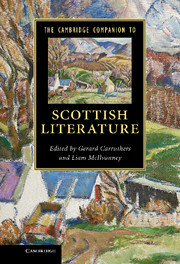Book contents
- Frontmatter
- Contents
- Notes on Contributors
- Acknowledgements
- Chronology
- Introduction
- 1 Scottish Literature before Scottish Literature
- 2 The Medieval Period
- 3 Reformation and Renaissance
- 4 The Aftermath of Union
- 5 Robert Burns
- 6 Enlightenment, Romanticism and the Scottish Canon
- 7 Scott and the Historical Novel
- 8 The Gaelic Tradition
- 9 Scottish Gothic
- 10 Victorian Scottish Literature
- 11 Robert Louis Stevenson
- 12 Hugh MacDiarmid and the Scottish Renaissance
- 13 Popular Fiction
- 14 Muriel Spark
- 15 The Glasgow Novel
- 16 ‘What is the language using us for?’
- 17 The Emergence of Scottish Studies
- 18 Otherworlds
- 19 Scottish Literature in Diaspora
- Index
- References
5 - Robert Burns
Published online by Cambridge University Press: 05 January 2013
- Frontmatter
- Contents
- Notes on Contributors
- Acknowledgements
- Chronology
- Introduction
- 1 Scottish Literature before Scottish Literature
- 2 The Medieval Period
- 3 Reformation and Renaissance
- 4 The Aftermath of Union
- 5 Robert Burns
- 6 Enlightenment, Romanticism and the Scottish Canon
- 7 Scott and the Historical Novel
- 8 The Gaelic Tradition
- 9 Scottish Gothic
- 10 Victorian Scottish Literature
- 11 Robert Louis Stevenson
- 12 Hugh MacDiarmid and the Scottish Renaissance
- 13 Popular Fiction
- 14 Muriel Spark
- 15 The Glasgow Novel
- 16 ‘What is the language using us for?’
- 17 The Emergence of Scottish Studies
- 18 Otherworlds
- 19 Scottish Literature in Diaspora
- Index
- References
Summary
Robert Burns (1759–96) needs no introduction as Scotland’s national poet, but he also has a good claim to be considered the most original British poet writing between Alexander Pope and William Blake. Developing the eighteenth-century tradition of Scots verse associated with Allan Ramsay and especially Robert Fergusson, Burns crafted the first modern vernacular style in British poetry, providing a resource for subsequent verse written in non-standard English, especially by ‘peasant poets’ like James Hogg, Robert Bloomfield and John Clare, as well as later American poets like Walt Whitman. More immediately, Burns was a vital influence on the British Romantics, especially Wordsworth, in championing the values of rural and peasant life, and (despite Burns’s own debts to Pope, Gray and Shenstone) attacking the generalist aesthetics and poetic diction of much eighteenth-century Augustan poetry. Ironically though, while still enthusiastically celebrated in Scotland and globally at Burns Suppers on 25 January, Burns has been marginalised in English departments across the world, as a result of a mistaken view that his writing is linguistically incomprehensible, and of interest to Scottish readers only.
Burns was born on 25 January 1759, in Alloway, near Ayr, where his father William Burnes (the poet later dropped the ‘e’ from his surname) was initially employed as head gardener, before embarking on an ill-starred career as a tenant farmer at nearby Mount Oliphant and, later, Lochlie, in central Ayrshire. Robert described boyhood life on the farm as ‘the cheerless gloom of a hermit with the unceasing moil of a galley-slave’, and laboured at the plough to save his father the cost of hiring additional labour. Later, at the time of William Burnes’s death in 1784 (precipitated by a stressful litigation with the landlord of Lochlie), Robert took the joint lease of the farm of Mossgiel, near Mauchline, with his brother Gilbert. It was here that most of the poems published in his first Kilmarnock volume of 1786 were written, at a time when his farming career looked untenable, and his personal and amorous affairs had reached a crisis.
- Type
- Chapter
- Information
- The Cambridge Companion to Scottish Literature , pp. 71 - 85Publisher: Cambridge University PressPrint publication year: 2012
References
- 1
- Cited by

